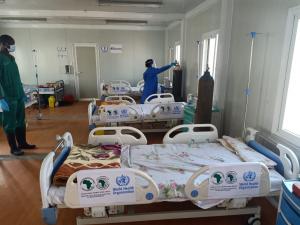South Sudan: African Development Bank and WHO enhance COVID-19 case management
Juba, South Sudan, 3 April 2021 -The African Development Bank and WHO have delivered essential medical supplies, including intensive care unit (ICU) beds, medicines, lifesaving biomedical equipment and personal protective equipment (PPE) to South Sudan’s Ministry of Health in support of the country’s ongoing COVID-19 response.
The supplies include12 ICU beds, over 5 000 infection prevention and control items, 20 oxygen concentrators, 71 blood pressure monitoring machines and over 250 boxes of various essential medicines to treat COVID-19 patients across 18 prioritized treatment facilities as well as support home isolation intervention.
“Infectious diseases continue to pose a major public health threat in South Sudan”, said Dr Richard Lako, Incident Manager at the Ministry of Health. “The African Development Bank’s generous contribution will strengthen the response to tackle the negative impacts of COVID-19, including the protection and safety of health workers, an important priority,” Dr Lako added.
African Development Bank Country Manager for South Sudan, Benedict Kanu, said the health situation was compounded by the threat of rising food insecurity. “Until a safe, effective and affordable coronavirus vaccine is available, the risk of infection will continue, particularly given South Sudan’s high level of vulnerability to the pandemic.”
The UN’s Food and Agriculture Organization had warned that South Sudan faces a potential famine: “The risk of COVID-19 in South Sudan is rated as high, given the inadequate healthcare infrastructure. Therefore, we cannot over-emphasize the need to strengthen health systems and activate a timely response to cases of COVID-19 and future pandemics.”
Since the beginning of the pandemic, WHO and the South Sudanese Health Ministry have trained over 380 health workers on the clinical care of COVID-19 patients at national and sub-national levels across the country.
Besides materials supply, WHO has provided technical support, including the development, adaptation and revision of guidance and standard operating procedures for an effective COVID-19 response to the Health Ministry and partners.
Dr Fabian Ndenzako, WHO representative for South Sudan said the supplies were procured based on prioritized needs to bolster the country’s COVID-19 response.
“Pandemics of the magnitude such as COVID-19 and other health emergencies often result in the disruption of health services and greater mortality, largely due to inadequate essential medicines and equipment in the context of an overburdened health care services,” Dr Ndenzako said.
“WHO is grateful for the partnership with the AfDB that will help us to support the Ministry of Health in the fight against COVID-19 and support continuity of health as part of mitigating the socio-economic impacts of the pandemic”, Dr Ndenzako added.
For more information, please contact:
African Development Bank: Kwasi Kpodo, Communication and External Relations Department, email: w.kpodo [at] afdb.org (w[dot]kpodo[at]afdb[dot]org)
WHO: Ms Jemila M. Ebrahim, email: ebrahimj [at] who.int (ebrahimj[at]who[dot]int)



